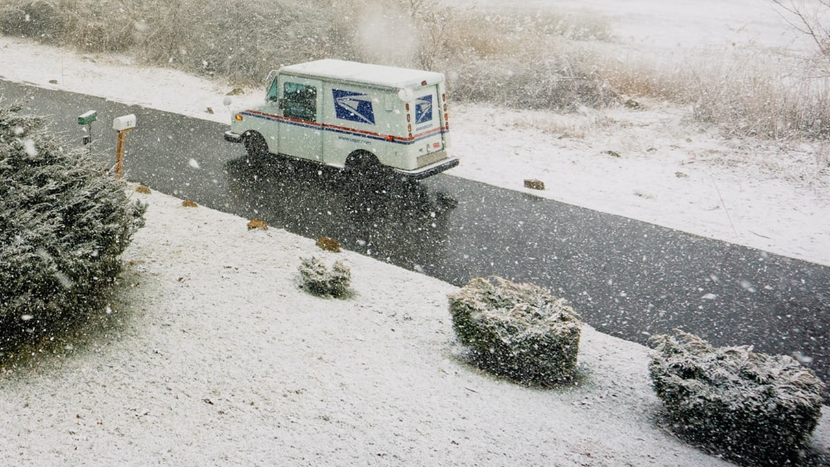“Neither snow, nor rain, nor heat, nor gloom of night stays these courageous couriers from the swift completion of their appointed rounds.” — Herodotus
In 1912, one of the architects working on what is now known as the James A. Farley Building at the corner of Eighth Avenue and 33rd Street in Manhattan convinced the U.S. Postal Service to put a version of Herodotus’ comment on the building.
Herodotus, the Greek who is known as the father of history, wrote this in his 425 BCE book about the Persian Wars, The Histories. The Greeks won the wars, but Herodotus admired the courier system that their enemies, the Persians, developed and used to communicate.
Architect William Mitchell Kendall, in turn, admired classical Greek literature.
The motto, never an official policy or directive of the USPS, is an inspired piece of public relations.
Except, of course, when it is not.
Unofficial Motto
For over a hundred years, Americans have heard this statement. For most, it inspires images of tireless mail carriers braving extreme weather to deliver a letter from Grandma, or more likely, the latest weekly flyer from a local big-box store. Every winter—and this winter is no exception—the USPS decides to put the safety of its mail carriers first, and to delay delivering mail until the weather clears.
That delay really upsets many postal customers. After all, “neither snow, nor rain, …” Right? They feel betrayed when the USPS fails to keep a promise that it couldn’t possibly keep. All the while, the USPS still promotes this “unofficial motto”.
Perfection as a Goal
Early in my career as a process engineer, I frequently worked with a sales manager who I respected a lot. In part, it was because he came from a manufacturing background and understood what we were up against. When I asked him why he got out of manufacturing and into sales, he explained that in manufacturing, anything less than perfection was a failure. “The company might budget for a less than perfect yield or less than ideal rates, but every busted batch or production delay was still seen as a failure. I couldn’t accept failure, and I knew perfection wasn’t possible. I had to get out.”
That’s a problem with setting perfection as the goal. Nothing is perfect. Nothing can be perfect. That means that everything fails to meet the goal of perfection, disappointing anyone who put any confidence in that goal.
As a kid, I was fascinated with the exploits of daredevils like Evel Knievel who jumped longer and longer obstacles on their motorcycles. There was even talk of one day jumping the Grand Canyon. The problem with attempting to jump the Grand Canyon on a motorcycle is that one either makes it (extremely unlikely) or one doesn’t. Those that don’t make it aren’t admired for the attempt. They are simply pitied as one more fiery crash at the bottom of the canyon. It doesn’t matter how close they got.
Zero Incidents
The chemical process industry has embraced the goal of zero incidents. Banners and slogans proudly proclaim, to employees and the public, that an organization is striving for zero incidents. Any rational person should look at such a declaration and know that at best, it is aspirational. What typically happens, though, is that the goal of zero incidents is largely ignored as long as there are no incidents, or cynically shrugged off as a public relations ploy. Then, when there is an incident, those that care seize on the incident as evidence of insincerity.
When things are going well, “Zero Incidents” gets no attention. It’s just what we’ve been led to expect. The close scrutiny doesn’t begin until after something has gone wrong. It’s only then that we step up. There are investigations, reports, new procedures, training. Much is said, much is done. Some of it is even helpful in reducing the likelihood that a similar incident will happen again. But it is not “zero incidents”.
Inspiring Cynicism
Expecting that nothing will stay mail carriers from the swift completion of their appointed rounds is a clever bit of public relations, but there are good reasons that it is not USPS policy, or even the official motto of the USPS. What Herodotus said in a moment of admiration for a defeated enemy is not a rational approach to running an organization. But it is inspiring.
Likewise, promising the achievement of zero incidents is not a promise that can be kept. It is most likely just to inspire cynicism.
Making Promises We Can Keep
The problem is not in aspiring to get better, aspiring to avoid repeating the mistakes of the past. The problem is in promising perfection, a promise that cannot be kept.
We need to get better, to be safer. That will not happen if we don’t actively work to get better. An approach that will be more effective than declaring a goal of perfection, however, is declaring a goal of constantly getting better. Constantly getting better means constantly looking for ways to be safer. Not just in response to an incident, but constantly.
That is a promise we can keep.
